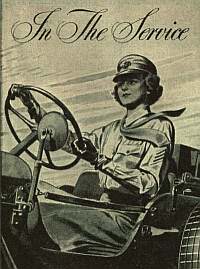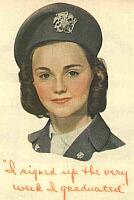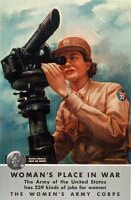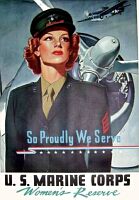During WWII American women received an urgent call to do their
patriotic duty and help to win the war.
.
 |
This war was more horrendous than any conflict since the American
Civil War, and demanded more soldiers than any war before. Women were asked
foremost to participate actively on vital jobs behind the lines in order
to make up for manpower shortage within the national labor work force.
.
Their service speeded the war’s end by adding new strength to the
military and industries essential to the war effort. At the same time,
American women's participation in World War II was a difficult pioneering
effort for all involved, and there were considerable social obstacles that
prevented unhindered female progress. |
.
| The armed forces had special concerns about including women’s assistance.
However, the military necessity proved critical for their utilization on
a large scale. Therefore the Army, Navy, Marine, Coast Guard all authorized
special women’s units during 1943, despite misgivings at higher echelons. |
...... |
 |
.
In addition, civil organizations like the Red Cross or the Public
Health Service requested more female personnel to support their work during
wartime, although these roles were much more traditional and therefore
“safe” within a society context.
.
 |
vv |
Big recruitment campaigns tried to convince women to join a service,
group or club. Numerous poster campaigns, brochures, newspaper advertisements
and even movies tried to recruit as many women as possible in a wide range
of jobs.
Target groups were the educated young and skilled women between 20
and 50 years of age. |
.
At the same time, there was considerable social pressure against
women fully participating in war efforts where it clashed with civilian
values and moral conservatism of the time.
.
| For example, during World War II, the US military generally denied
women the ability to supervise or directly govern male soldiers. While
women could be appointed officers and noncommissioned officers, their supervisory
powers were usually limited to the ability to supervise or control other
women in the performance of military duties. Very rarely did women hold
positions enabling them to determine men's career advancement, rate men's
performance, or actually control and order men around in wartime jobs. |
. |
 |
.
 |
...vv |
One of the reasons for this limitation is surely premised on America's
fundamental belief in conservative Biblical scripture, especially true
during the World War II era. The biblical advice of the apostle Paul states:
"I do not permit a woman to teach or to have authority over a man; she
must be silent." This instruction is contained in the Bible's First Epistle
to Timothy of the New Testament. Therefore, the limitation of women's
power in the armed forces during World War II also reflects the conservative
religious convictions of United States society during the 1930s and 1940s. |
..
Many men tried to prevent wives, daughters or girlfriends from joining
activities that would take them away from home or place them in non-traditional
lines of work regarded as properly the “male sphere.”
.
Yet millions of women sallied forward to make a positive war contribution.
In addition to patriotic reasons, many jobs offered good payment, training
and valuable experiences. The military, for example, additionally provided
their members food and lodging, clothing and equipment as well as medical
care and other free services. These were very attractive conditions for
poorer women. |
 |
.
 |
Some female jobs represented spectacular breakthroughs for women
in traditional male employment. Unfortunately, in the male-dominated era
of that time, plenty of female assignments proved tedious and routine,
and even redundant and full of drudgery. Many were highly dangerous,
such as work at volatile powder plants. Other women were placed on tasks
of the most advanced importance, on the forefront of scientific innovation
and combat battlefields, and often competed directly in a world usually
reserved for male performers. Regardless, every job was considered vital
because it contributed in its own way toward final victory. |
| Those women who followed the call of duty were easily to be identified
by wearing proudly their distinctive uniform.
On this homepage, we want to inform you about the important job which
American women did during WWII, despite their tremendous and sometimes
hazardous difficulty, and how you can distinguish them by their uniform.
We hope that our work is especially helpful for those who would like to
reenact a female service women during WWII.
. |
 |
|























